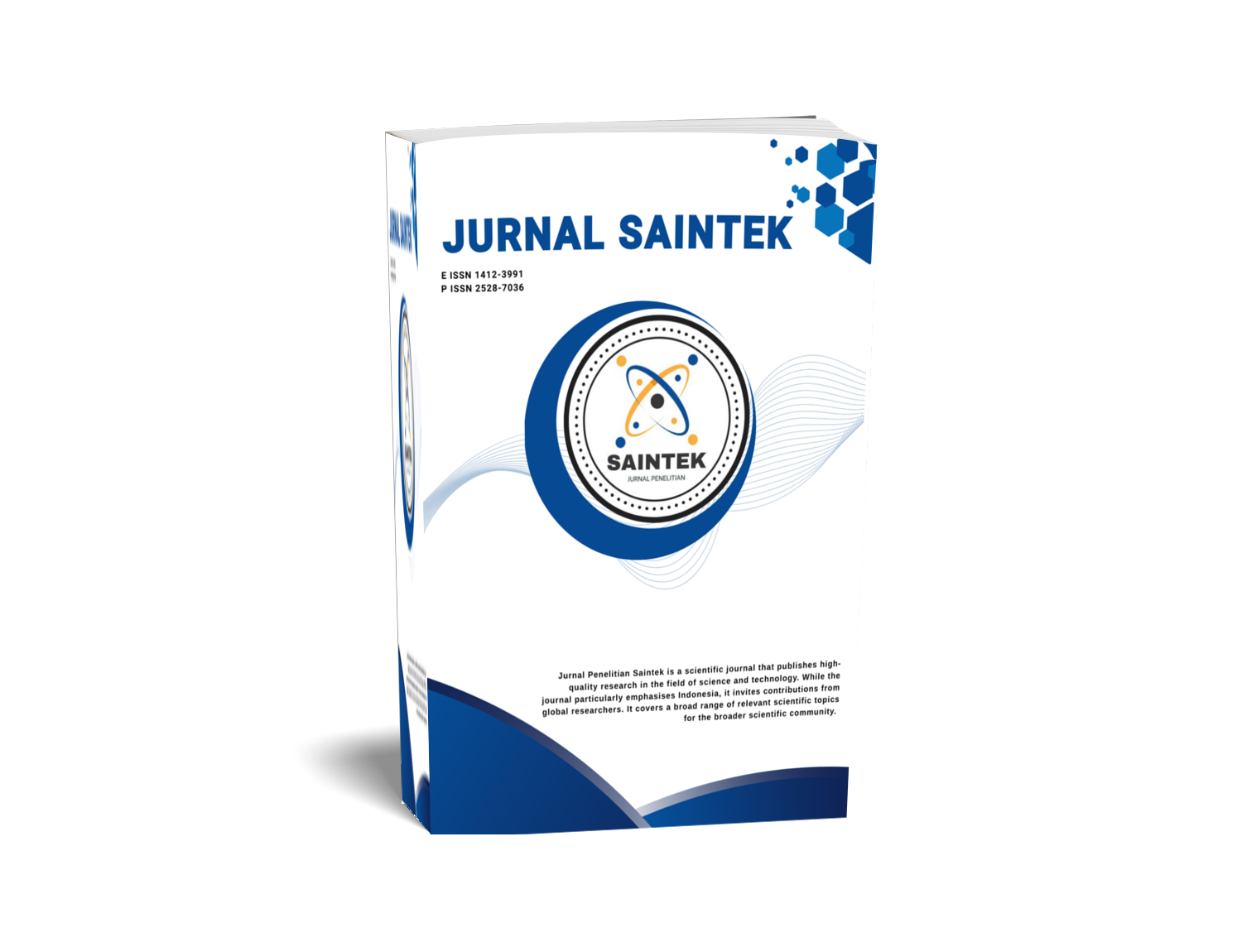Analysis of microbiological hazards in turmeric tamarind traditional drink products
DOI:
https://doi.org/10.21831/jps.v1i1.70596Abstract
This study aimed to determine the presence of bacterial contaminants, specifically Escherichia coli, Salmonella sp., and Staphylococcus aureus, in turmeric tamarind traditional drink products according to the Indonesian National Standard (SNI 2019). The research was conducted using samples from 11 different locations in Yogyakarta. The samples were analyzed using Chromocult Coliform Agar (CCA), Salmonella Shigella Agar (SSA), and Baird Parker Agar (BPA) to isolate the specific bacteria. Further biochemical tests, including IMViC, Urease, and sugar fermentation tests, as well as confirmation using API 20E and API STAPH tests, were performed on the suspected isolates. The findings reveal that Escherichia coli, Salmonella sp., and Staphylococcus aureus were not detected in any of the samples. Thus, the traditional turmeric tamarind drink is considered safe for consumption according to the tested parameters.
Keywords: turmeric tamarind, microbiological hazard, Klebsiella pneumoniae, Staphylococcus aureus. E. coli
References
Adil, A. S., & Kundarto, W. (2019). Evaluasi penggunaan antibiotik pada pasien geriatri wanita infeksi saluran kemih di Instalasi Rawat Inap RSUD Dr. Moewardi Surakarta Tahun 2017. JPSCR : Journal of Pharmaceutical Science and Clinical Research, 4(1), 01. https://doi.org/10.20961/jpscr.v4i1.22882
A'yunin, N. A. Q., Santoso, U., & Harmayani, E. (2019). Kajian kualitas dan aktivitas antioksidan berbagai formula minuman jamu kunyit asam. Jurnal Teknologi Pertanian Andalas, 23(1), 37-48.
Assefa, A., & Girma, M. (2019). Prevalence and antimicrobial susceptibility patterns of Salmonella and Shigella isolates among children aged below five years with diarrhea attending Robe General Hospital and Goba Referral Hospital, South East Ethiopia. Tropical Diseases, Travel Medicine and Vaccines, 5(1). https://doi.org/10.1186/s40794-019-0096-6
Beshiru, A., Okoh, A. I., & Igbinosa, E. O. (2022). Processed ready-to-eat (RTE) foods sold in Yenagoa Nigeria were colonized by diarrheagenic escherichia coli which constitute a probable hazard to human health. PLoS ONE, 17(4 April), 1-18. https://doi.org/10.1371/journal.pone.0266059
Brenner, D. J., & Farmer III, J. J. (2015). Enterobacteriaceae. Bergey's Manual of Systematics of Archaea and Bacteria (pp. 1-24). Wiley. https://doi.org/10.1002/9781118960608.fbm00222.
Budiarso, T. Y., Amarantini, C., Prihatmo, G., Restiani, R., Putri, Y., Kindagen, V., & Linggardjati, S. (2021). Detection of coliforms and enteric pathogens in favorite snack food sold in Yogyakarta City. Proceedings of the 7th International Conference on Research, Implementation, and Education of Mathematics and Sciences (ICRIEMS 2020), 528(March 2018), 40-48. Atlantic Press. https://doi.org/10.2991/assehr.k.210305.007
Cunha, M. L. R.S., Sinzato, Y. K., & Silveira, L. V. (2004). Comparison of methods for the identifi-cation of coagulase-negative staphylococci. Mem Inst Oswaldo Cruz, Rio de Janeiro, 99(8).
Duvenage, S., Rossouw, W., Villamizar-Rodríguez, G., Du Plessis, E. M., & Korsten, L. (2021). Antibiotic resistance profiles of Staphylococcus spp. From white button mushrooms and handlers. South African Journal of Science, 117(11-12), 1-7. https://doi.org/10.17159/SAJS.2021/8667
El-Hadedy, D., & El-Nour, S. A. (2012). Identification of ataphylococcus aureus and escherichia coli isolated from Egyptian food by conventional and molecular methods. Journal of Genetic Engineering and Biotechnology, 10(1), 129-135. https://doi.org/10.1016/j.jgeb.2012.01.004
Gorrie, C. L., MirÄeta, M., Wick, R. R., Judd, L. M., Lam, M. M. C., Gomi, R., Abbott, I. J., Thomson, N. R., Strugnell, R. A., Pratt, N. F., Garlick, J. S., Watson, K. M., Hunter, P. C., Pilcher, D. V., McGloughlin, S. A., Spelman, D. W., Wyres, K. L., Jenney, A. W. J., & Holt, K. E. (2022). Genomic dissection of klebsiella pneumoniae infections in hospital patients reveals insights into an opportunistic pathogen. Nature Communications, 13(1). https://doi.org/10.1038/s41467-022-30717-6
Gí¶tz, F., Bannerman, T., & Schleifer, K-H. (2006). The genera staphylococcus and macrococcus In M. Dworkin, S., Falkow, E. Rosenberg, K. H. Schleifer, & E. Stacke-brandt (Eds.), The Prokaryotes (pp. 5-75). https://doi.org/10.1007%2F0-387-30744-3_1
Hamida, F., Aliya, L. S., Syafriana, V., & Pratiwi, D. (2019). Escherichia coli resisten antibiotik asal air keran di kampus ISTN. Jurnal Kesehatan, 12(1). https://doi.org/10.23917/jk.v12i1.8958.
Harada, T., Taguchi, M., Kawahara, R., Kanki, M., & Kawatsu, K. (2018). Prevalence and antimicrobial susceptibility of bacterial pathogens in ready-to-eat foods retailed in Osaka prefecture, Japan. Journal of Food Protection, 81(9), 1450-1458. https://doi.org/10.4315/0362-028X.JFP-18-035
Hettiarachchi, S. S., Perera, Y., Dunuweera, S. P., Dunuweera, A. N., Rajapakse, S., & Rajapakse, R. M. G. (2022). Comparison of antibacterial activity of nanocurcumin with bulk curcumin. ACS Omega, 7(50), 46494-46500. https://doi.org/10.1021/acsomega.2c05293
Hiko, A., & Muktar, Y. (2020). Levels of microbial contamination in non-alcoholic beverages from selected eastern Ethiopian towns markets. Scientific African, 7. https://doi.org/10.1016/j.sciaf.2019.e00223
Johny, R., Srilatha, C. M., Bisht, D. S., Ranjith, A., & Darsana, R. (2021). A study on the growth of lichthemia corymbifera on different cultural media which demonstrate the needs of strong antifungal agent in Baird Parker Medium for the isolation of staphylococcus aureus from spice samples. International Journal of Research in Engineering, Science and Management, 4(8), 269-273. https://journal.ijresm.com/index.php/ijresm/article/view/1245
Kasta, G. (2020). Antimicrobial activity of ethanol extract of rhizome turmeric (Curcuma longa L.) for growth of escherichia coli, staphylococcus aureus and candida albicans. Asian Journal of Pharmaceutical Research and Development, 8(3), 5-8. https://doi.org/10.22270/ajprd.v8i3.712
Khalifa, A. Y. Z., Alsyeeh, A. M., Almalki, M. A., & Saleh, F. A. (2016). Characterization of the plant growth promoting bacterium, enterobacter cloacae MSR1, isolated from roots of non-nodulating medicago sativa. Saudi Journal of Biological Sciences, 23(1), 79-86. https://doi.org/10.1016/j.sjbs.2015.06.008
Leroy, S., Christieans, S., & Talon, R. (2019). Tetracycline gene transfer in staphylococcus xylosus in situ during sausage fermentation. Frontiers in Microbiology, 10(MAR). https://doi.org/10.3389/fmicb.2019.00392
Lukito, P. K. (2019). Badan pengawas obat dan makanan republik indonesia.
Muruhan, S., Rajan, M., & Konuku, S. (2012). Morphological and biochemical characteristics and antibiotic resistance pattern of staphylococcus aureus isolated from grapes. International Journal of Nutrition, Pharmacology, Neurological Diseases, 2(1), 70. https://doi.org/10.4103/2231-0738.93135
Naratama, M. R., & Santoso, I. (2020). Non-fecal and fecal coliform tests of ready-to-eat food and drinks using fluorogenic and chromogenic media. Journal of Physics: Conference Series, 1442(1). https://doi.org/10.1088/1742-6596/1442/1/012064
Nethathe, B., Matsheketsheke, P. A., Mashau, M. E., & Ramashia, S. E. (2023). Microbial safety of ready-to-eat food sold by retailers in Thohoyandou, Limpopo province, South Africa. Cogent Food and Agriculture, 9(1). https://doi.org/10.1080/23311932.2023.2185965
Nocera, F. P., Ferrara, G., Scandura, E., Ambrosio, M., Fiorito, F., & De Martino, L. (2022). A preliminary study on antimicrobial susceptibility of staphylococcus spp. and enterococcus spp. grown on mannitol salt agar in European Wild Board (Sus scrofa) hunted in Campania Region"”Italy. Animals, 12(1). https://doi.org/10.3390/ani12010085
Piekarska-Radzik, L., Klewicka, E., & Otlewska, A. (2022). Analysis of phenotypic and genotypic antibiotic resistance of food isolates of staphyloccus spp. Acta Scientiarum Polonorum, Technologia Alimentaria, 21(4), 411-428. https://doi.org/10.17306/J.AFS.2022.1097
Pitout, J. D. D., Nordmann, P., & Poirel, L. (2015). Carbapenemase-producing klebsiella pneumoniae, a key pathogen set for global nosocomial dominance. Antimicrobial Agents and Chemotherapy, 59(10), 5873-5884.https://doi.org/10.1128/AAC.01019-15
Priyandina, L. S., Yuliawati, S., & Hestiningsih, R. (2017). Studi keberadaan escherichia coli dan jamur pada minuman serbuk yang dijual di wilayah sekolah dasar Kecamatan Banyumanik Kota Semarang. Jurnal Kesehatan Masyarakat, 5(4), 418-423. https://doi.org/10.14710/jkm.v5i4.18412.
Sholichah, V. (2012). Kualitas mikrobiologi jamu gendong jenis kunir asem yang diproduksi di Kelurahan Merbung, Kecamatan Klaten Selatan, Kabupaten Klaten. Jurnal Kesehatan Masyarakat, 1(2), 18864.
Sutejo, S. V. H., Amarantini, C., & Budiarso, T. Y. (2017). Molecular detection of Staphylococcus aureus resistant to temperature in milk and its products. AIP Conference Proceedings, 1908. https://doi.org/10.1063/1.5012731
Tango, C. N., Hong, S. S., Wang, J., & Oh, D. H. (2015). Assessment of enterotoxin production and cross-contamination of staphylococcus aureus between food processing materials and ready-to-eat cooked fish paste. Journal of Food Science, 80(12), M2911-M2916. https://doi.org/10.1111/1750-3841.13143
Thaker, H. C., Brahmbhatt, M. N., & Nayak, J. B. (2013). Isolation and identification of staphylococcus aureus from milk and milk products and their drug resistance patterns in Anand, Gujarat. Veterinary World, 6(1), 10-13. https://doi.org/10.5455/vetworld.2013.10-13
Tivani, I., Amananti, W., & Sunardi, A. (2019). Uji identifikasi bakteri esherichia coli pada jamu gendong kunyit asem di Kabupaten Tegal. Para pemikir: Jurnal Ilmiah Farmasi, 8(1), 31-35. https://doi.org/10.30591/pjif.v8i1.1297
Turner, K. M., Restaino, L., & Frampton, E. W. (2000). Efficacy of chromocult coliform agar for coliform and escherichia coli detection in foods. Journal of Food Protection, 63(4).
Veliev, A., & Nakipoglu, Y. (2022). Investigation of staphylococcus lugdunensis and selected coagulase negative staphylococci isolated from blood culture bottles and determination of their sensitivities to antibiotics. Pakistan Journal of Medical Sciences, 38(3), 657-662. https://doi.org/10.12669/pjms.38.3.4738
Wen, X., Chen, F., Lin, Y., Zhu, H., Yuan, F., Kuang, D., Jia, Z., & Yuan, Z. (2020). Microbial indicators and their use for monitoring drinking water quality"”A review. Sustainability, 12(6), 2249. https://doi.org/10.3390/su12062249
Yennie, Y., Dewanti-Hariyadi, R., Kusumaningrum, H. D., & Poernomo, A. (2022). Kontaminasi staphylococcus aureus dan bacillus cereus pada sushi di tingkat ritel di wilayah Jabodetabek. Jurnal Pengolahan Hasil Perikanan Indonesia, 25(2). https://doi.org/10.17844/jphpi.v25i2.42066
Yolanda, T., Darmayanti, L. P. T; Duniaji, A. S. (2021). Studi aspek mikrobiologis dan kimiawi minuman jamu gendong kunyit asam di Jimbaran dan Kedonganan, Bali. Jurnal Ilmu dan Teknologi Pangan (ITEPA), 10(1), 97-107. https://doi.org/10.24843/itepa.2021.v10.i01.p09.
Yusuf, F. M., & Nurkhasanah, N. (2015). Evaluasi kadar kurkumin dalam jamu tradisional kunir asam yang dijual di pasar Kota Gede bulan Februari 2015. Pharmaceutical Sciences and Research, 2(3), 1.
Downloads
Published
How to Cite
Issue
Section
Citation Check
License
Who Can Submit?
Any individual may submit an original manuscript for consideration for publication in Jurnal Penelitian Saintek as long as they hold the copyright to the work or are authorized by the copyright owner(s) to submit it. Authors retain initial ownership of the copyrights to their works prior to publication, except in cases where, as a condition of employment, they have agreed to transfer copyright to their employer.
User Rights
Jurnal Penelitian Saintek is an Open Access journal. Users are granted the right to read, download, copy, distribute, print, search, or link to the full texts of articles, provided they comply with the conditions of the Creative Commons Attribution-ShareAlike License 4.0 (CC BY-SA 4.0).
https://creativecommons.org/licenses/by-sa/4.0/
Author Rights
Authors retains copyrights.
Jurnal Penelitian Saintek by http://journal.uny.ac.id/index.php/saintek is licensed under a Creative Commons Attribution-ShareAlike 4.0 International License.









